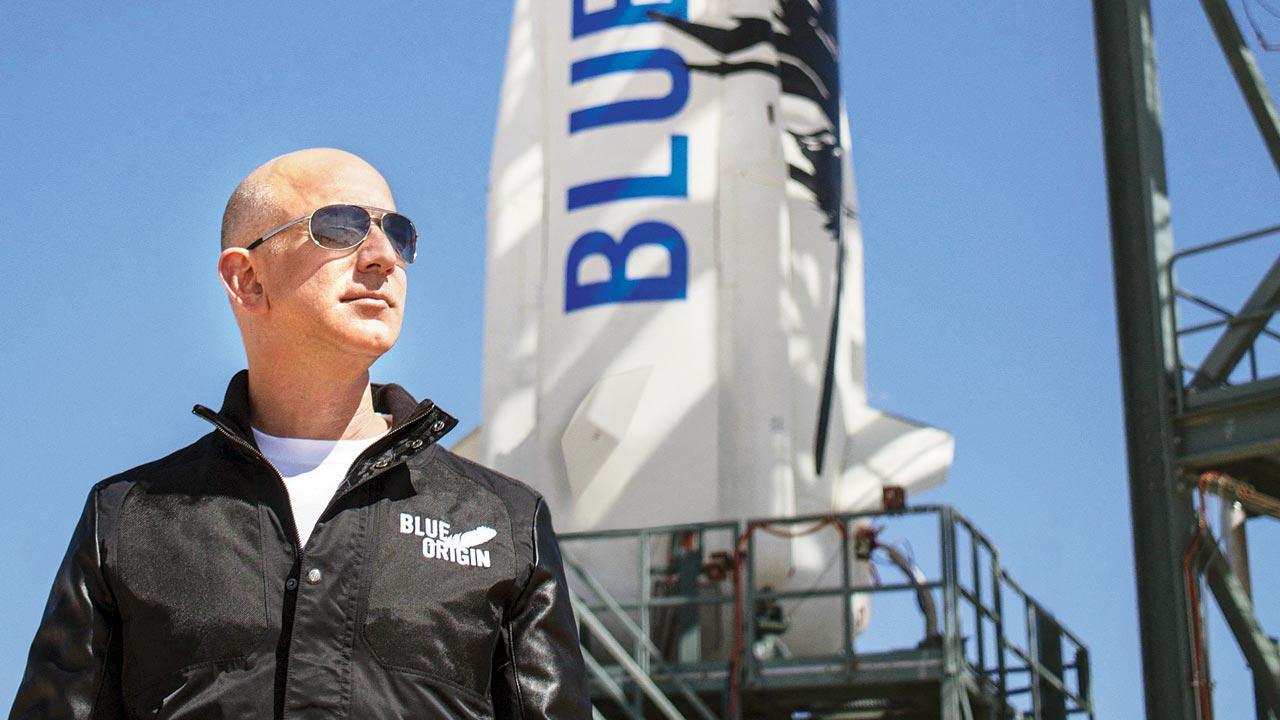Something is very wrong with our lives and the world’s billionaires are symptoms of the disease. What if you opened your eyes and called a spade a spade?

Bezos earns an estimated $8,961,187 per hour. One of his employees being paid $15 an hour would have to work 24 hours a day for 68 years to earn that much
The richest man in the world, Mr B, just had his “best day ever”. Jeff Bezos, the owner of Amazon, travelled 60 miles up in a spaceship to outer space. From takeoff to touchdown, the journey lasted a mere 11 minutes, of which four were outside the earth’s gravitational field, hence weightless.
ADVERTISEMENT
How much would you pay to be weightless for four minutes? Bezos spent around USD 5.5 billion to launch himself into space. That’s a lot of change—USD 5,500,000,000.
How much money do you suppose Mr Bezos makes in 11 minutes?
Business Insider estimated that he takes in USD 8,961,187 per hour. While he floated in the zero gravity of outer space, he raked in roughly USD 1.6 million.
I think of Bezos as an unimpressive, vulgarly rich American. He overworks his employees, underpays them and doesn’t always pay his taxes. One of those workers, earning the minimum wage of USD 15 an hour would have to work 24 hours a day for 68 years to earn what Bezos makes in one hour.
Nearer home, we have our Mr A, Mukesh Ambani, another person of no great intellectual or moral weight but just as vulgarly rich. According to an Oxfam report, he earned R90 crore an hour during the pandemic. Roughly 24 per cent of Indians earned R12.5 an hour during the pandemic.
Mr A is even more egregious than Mr B. In the thick of a vicious disease where people were cremating loved ones in car parks, Mr A earned 72,000,000 times more in an hour than the average suffering Indian. No matter how shrewd a businessman Mr A is, there is something crass about one man earning so much when so many are groveling in misery.
The obscenity of the personal lifestyles of Mr A and Mr B made me think deep and hard about the things we’ve been told to accept as normal—but shouldn’t.
Something is very wrong with our lives.
It shouldn’t be acceptable that rich people get richer while the poor get poorer. During the pandemic, worldwide people lost USD 3.7 trillion in income. The world’s billionaires gained USD 3.9 trillion in the same period. A mere 0.002 per cent of the world’s population—individuals worth more than USD 330 million each—hold 6.2 per cent of the world’s wealth.
It’s time you stopped believing the Tony Robbins and Napoleon Hills who preach that one day you too could rise out of middle-class drudgery and be like Mr A or Mr B. They tell you that visualising wealth creates wealth, that positive thinking attracts positive events, and that it’s all in your hands. It’s utterly untrue but thoughts like this keep you docile, uncritical and uncomplaining, blaming yourself when things go wrong.
The truth—Mr A lives in a 27-storey building precisely because you never will. No matter how many self-help books you swallow whole, you will never own a golf course, a Learjet and a swimming pool. Call the bluff now.
Admit that there’s something disturbingly odd about a system that lets you choose only once every five years between two individuals—and calls that democracy. Whoever wins, you are deemed to have presumptively consented to whatever he will do for the next five years. You voted for a person and inherited a platform, full of details no one ever shared with you. He decides where your shoe pinches and whether you should live with the pinch. Protest and you are subversive, unpatriotic or anti-national.
For rape to be taken as a serious crime, thousands have to march for weeks. For farmers to feel the leaders have their interests at heart, they must block national highways with their tractors on the highway for months.
You soon realise that the person you chose is not your servant, he is your overlord.
I have a theory. I believe human beings have rather simple needs—kindness, cooperation, empathy, altruism, civility and decency. A government that cannot deliver those has failed profoundly, no matter how well it manages the interest, the GDP and Foreign Direct Investment. Our lives are not transactions; we survive by holding hands.
For 15 years from 1989, in Puerto Rico’s Porto Allegro, the citizens did the planning and the government merely implemented. Every single metric of a better life from child mortality to sanitation and primary education, improved.
Iceland is blazing a thrilling trail in bottom-up leadership. In the Better Reykjavik programme, two-thirds of the city’s citizens worked together to develop a city improvement plan, voted on it, and took the final proposal to the council for them to implement. It was not a petition, it was a brief.
If the councillor didn’t accept the plan he had to give sound, reasoned arguments why.
The government was the employee. The people were the boss.
Here, viewed from there. C Y Gopinath, in Bangkok, throws unique light and shadows on Mumbai, the city that raised him. You can reach him at cygopi@gmail.com
Send your feedback to mailbag@mid-day.com
The views expressed in this column are the individual’s and don’t represent those of the paper
 Subscribe today by clicking the link and stay updated with the latest news!" Click here!
Subscribe today by clicking the link and stay updated with the latest news!" Click here!






